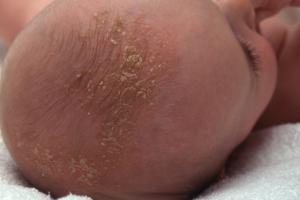Cradle cap
Cradle cap is the greasy, yellow scaly patches that sometimes appear on the scalps of young babies. It usually appears in babies in the first two months and clears up without treatment within weeks to a few months.
Signs and symptoms of cradle cap
Cradle cap is common, harmless and doesn't usually itch or cause discomfort.
It’s easy to recognise by the large, greasy, yellow or brown scales on your baby's scalp.

The scales flake and may make the affected skin look red. Sometimes the hair will come away with the flakes, but it will grow back.
It usually occurs on the scalp but can also affect the face, ears, neck, nappy area and armpits, and behind the knees.
Do not pick at the scales as this can cause an infection.
Cradle cap is not contagious and is not caused by poor hygiene or an allergy.
Treatment for cradle cap
Most cases of cradle cap clear up on their own without the need for treatment within weeks to a few months.
Tips to help reduce the build-up of scales on the scalp:
- regular washing of the scalp with a baby shampoo, followed by gentle brushing with a soft brush to loosen scales
- soften the scales with baby oil first, followed by gentle brushing, and then wash off with baby shampoo
- soak the crusts overnight with white petroleum jelly, or vegetable or olive oil, and shampoo in the morning
If these methods don't work, speak to your pharmacist about using a greasy emollient or soap substitute, such as emulsifying ointment.
There is usually no need to see your GP if your baby has cradle cap. You may want to ask them for advice if there is swelling to the scalp or if the cradle cap spreads to other parts of the body.
Special shampoos
You can buy special shampoo for cradle cap from a pharmacy. Always read the instruction leaflet to check it's safe to use on your child.
Avoid getting the shampoo in your baby's eyes. If you're unsure about using it, speak to a pharmacist for advice.
Treating an infection
If these home treatments don't lead to any improvement, your doctor may recommend an antifungal cream.
A mild steroid cream may also be recommended in some cases where the baby has a nappy rash.
When to see your GP
Speak to your GP if your baby's cradle cap:
- itches
- swells
- bleeds
- spreads to the face or body
Causes of cradle cap
It's not clear what causes cradle cap, although it may be linked to:
- high levels of an oily substance called sebum on affected areas
- a reaction to a yeast called malassezia on the skin
Cradle cap is a type of seborrhoeic dermatitis, a common irritation that affects oily skin in children and adults.
More useful links
The information on this page has been adapted from original content from the NHS website.
For further information see terms and conditions.